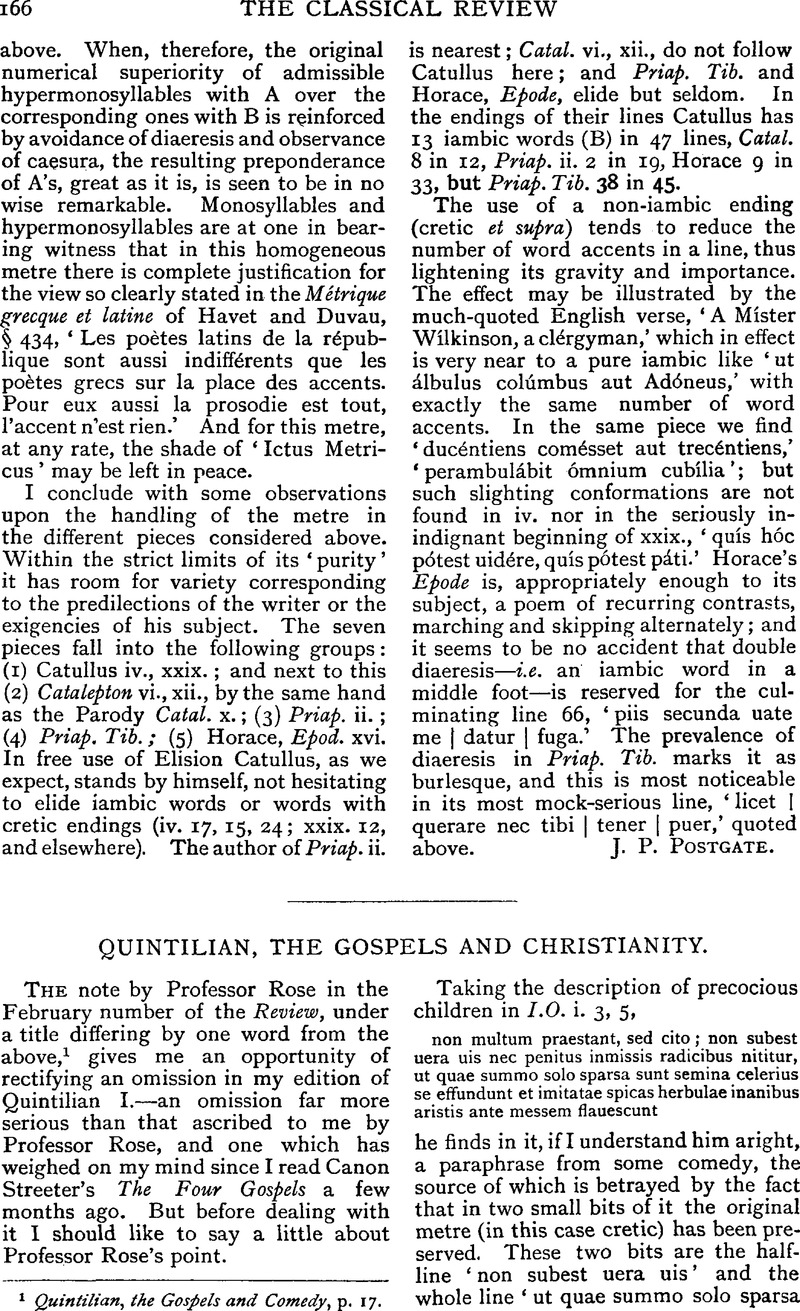No CrossRef data available.
Article contents
Quintilian, the Gospels and Christianity
Published online by Cambridge University Press: 27 October 2009
Abstract

- Type
- Review Article
- Information
- Copyright
- Copyright © The Classical Association 1925
References
page 166 note 1 Quintilian, the Gospels and Comedy, p. 17.
page 167 note 1 The nearest approach I have noticed is in ii. 13. 8, where Aen. iii. 436 ‘praecipiam ac repetens iterumque iterumque monebo’ is worked into the sentence without any definite mark of quotation. But quoting from Vergil is not the same thing to Quintilian as quoting from a comedy. The same may be said of ‘aureo plectro’ in x. 1. 63.
page 167 note 2 Peterson's remarks (Introduction to Book x., p. x) ought to have led me earlier to the main conclusion of this paper. He notes that it is ‘interesting to speculate on the possibility that through intercourse with Clemens and Domitilla and their children Quintilian may have come into contact with’ Judaism, which Peterson, I think erroneously, assumes to have been the ⋯θε⋯της of the parents.
page 168 note 1 Streeter, p. 536. The spirit of the remark is just, but is the phrasing quite accurate? Did Domitian's adoption of the boys involve any prospect of succession to Clemens himself? We have also to remember that Church tradition does not seem to have put Clemens on a par with Domitilla, and Canon Streeter does not suppose that he was actually baptised. In this case he was neither heir nor adherent in the fullest sense.
page 168 note 2 ![]() (D. C. lxvii. 14).
(D. C. lxvii. 14).
page 168 note 3 Dion's non-mention of Christianity has been explained as the result of bias. Here, at any rate, I should suppose that he is dependent on earlier authorities who did not distinguish between the two.
page 168 note 4 The only passages I know which would bear on this are: (a) iii. 7. 21, ‘est conditoribus urbium infame contraxisse aliquam perniciosam ceteris gentem, qualis est primus Iudaicae superstitionis auctor.’ However great was the breach between Jew and Christian, no one with any sympathy for Christianity could have spoken of Moses thus. But I doubt whether the passage is to be taken as any guide to Quintilian's feelings either about Moses or the Jews. He is merely sketching lines of argument which speakers might or did adopt. His dislike to Jews was at any rate not strong enough to prevent him from pleading for Queen Berenice in a Jewish court (iv. 1. 19). (b) The general tone of the well-known lament over the death of his younger son in the Proem of Book vi.: there is certainly not the slightest tinge of the Christian hope in this.
page 169 note 1 The non-Marcan document (which we call Q) which Matthew and Luke reproduced was probably, I imagine, not current at Rome. Otherwise we might have expected it to be preserved as Mark was, when it, like Q, was superseded. But, even if Q was known at Rome, it seems doubtful whether it contained much parabolic teaching (v. Streeter, pp. 243 and 291).
page 169 note 2 Of the earliest. Christian writers, Clement is usually dated a year or two after the Institutio. As to Barnabas estimates vary greatly, but some critics certainly put it as late as 97 or later. As for the Didache, a considerable body of opinion would, I believe, place it in the first century, but not necessarily earlier than 95.


